The Special Press Conference on Refuting “Forced Labor” by Xinjiang Uygur Autonomous Region
November 16, 2021

Photo taken on November 16, 2021 shows the special press conference on refuting “forced labor” by Xinjiang Uygur Autonomous Region. Photo by Xinjiang Daily/ Li Rui
On November 16, Xinjiang Uygur Autonomous Region held a special press conference to refute the rumor of so-called "forced labor". One industry leader, six citizens who were enterprise representatives and people from the general public were invited to refute the lie of "forced labor" concocted by anti-China forces in the United States and the west by sharing the stories of how they changed their life and created happiness through hardworking.
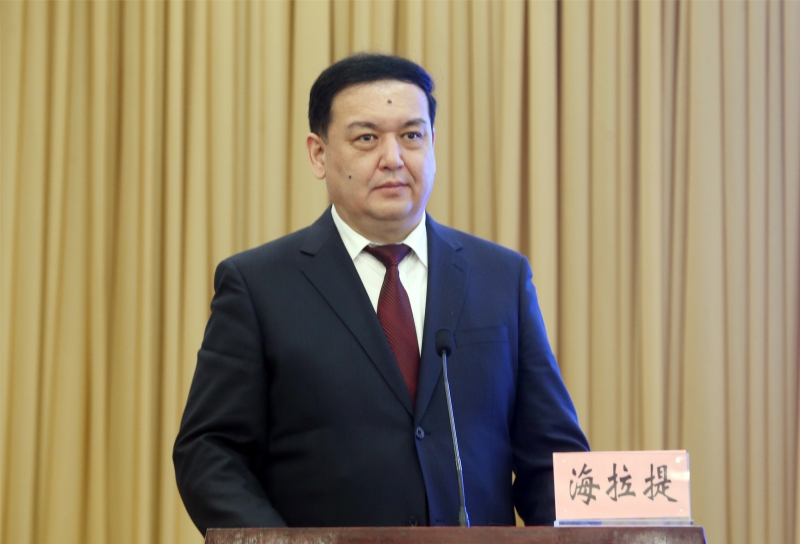
Photo taken on November 16, 2021 shows Hairatti, the host of the special press conference on refuting “forced labor” by Xinjiang Uygur Autonomous Region. Photo by Xinjiang Daily/ Li Rui
Host: Good morning, dear media reporters! Welcome to the press conference of Xinjiang Uygur Autonomous Region. I'm Hairatti, the host of this press conference.
It is been a while that the anti-China forces in the United States and the West have ignored Xinjiang's great efforts to protect human rights. Instead,they have concocted monstrous lies such as so-called "forced labor", discredited Xinjiang's efforts in ensuring the employment for workers, and successively attacked Xinjiang's cotton, tomato, photovoltaic and other industries based on those lies. Recently, American anti-China politicians published fallacies related to Xinjiang, saying that "there is forced labor associated with the oppression of Uygurs in Xinjiang". These despicable acts of framing Xinjiang without a bottom line but total madness will certainly be despised by the people of all ethnic groups in Xinjiang and criticized by people of insight in the international community.
The truth is the most powerful rumor shredder. The claim that there is "forced labor" in Xinjiang is absolutely absurd. It is completely a rumor with ulterior motives and also an outright lie. There is no so-called "forced labor" in Xinjiang, but only employment based on workers’ will. The labor and employment of people of all ethnic groups in Xinjiang are protected by law. They have the freedom to choose their careers, have their own wishes to go wherever they want to and do whatever work, and their personal freedom has never been restricted. What the government is doing is just to complete and improve various employment promotion policies, actively build an employment information platform, create a good labor and employment environment, create conditions for people of all ethnic groups to find satisfactory jobs and obtain stable income, and ensure the labor and employment rights of people of all ethnic groups to the greatest extent.
Some American and Western politicians and media would rather believe the lies made up by several people than listen to the voice of 25.85 million people of all ethnic groups in Xinjiang. They would rather cooperate with the clumsy farce of a few anti-China forces than face up to the fundamental facts of Xinjiang's development and progress. This can only prove that they do not care about the truth, but are keen on political manipulation, trying to artificially create the so-called Xinjiang problem, thus to undermine the security and stability of Xinjiang and hinder China's development and progress. Those so-called restrictive measures will not have a substantive impact on important industries in Xinjiang at all, but will only make the international community further recognize their hypocrisy and ulterior motives.
Today, we have invited Guzali Ablizi, the Deputy Secretary General of Xinjiang Cotton Association, to introduce the real situation of cotton production and picking in Xinjiang. At the same time, we have also invited six citizens including both enterprise representatives and those from the general public to share their stories of how hardworking changed their life and create happiness. They are Ehameittijiang Eskar, an employee of Xinjiang Ronghui Urban Ecological Environment Service Co., Ltd., Yalimeimeitti Abudurehman, a large-scale cotton grower in Bole City, Bortala Mongolian Autonomous Prefecture, Adilijiang Tuniyaz, a cotton-picker driver in Awat County of Aksu Prefecture, Meittikrimu Turson, a cotton farmer of Aktikantun Township Cotton Cooperative in Qiemo County of Bayingolin Mongolian Autonomous Prefecture, Yasen Meimeijiang, a tomato grower in Bohu County of Bayingolin Mongolian Autonomous Prefecture, and Abuduheli Kilimu, the Deputy General Manager of Safety Department of Hoshine Silicon (Shanshan) Co., Ltd.
Host: Ehameittijiang Eskar, from Karamay City, has been working in Xinjiang Ronghui Urban Ecological Environment Service Co., Ltd benefiting the policies of employment benefiting people. His monthly income with his wife has reached about 10,000 yuan, creating a happy life with his own hands. Next, let's give the floor to Ehameittijiang Eskar to tell his story.
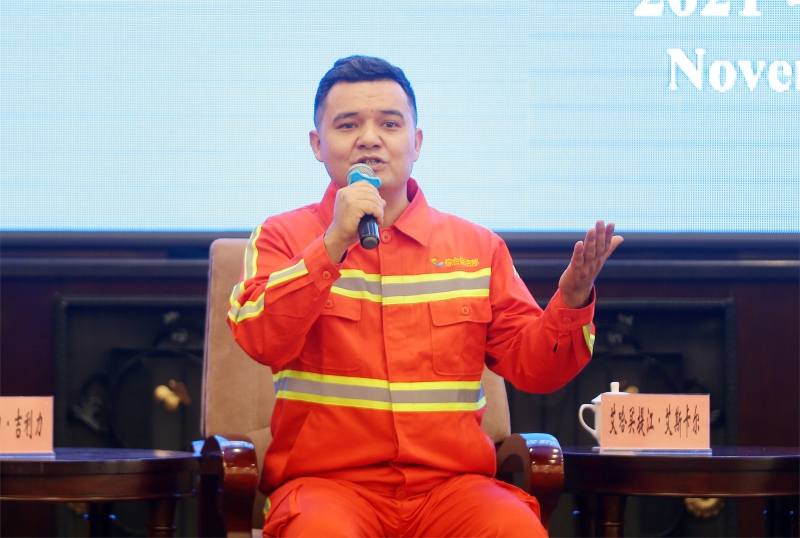
Photo taken on November 16, 2021 shows Ehameittijiang Eskar speaks at the special press conference on refuting “forced labor” by Xinjiang Uygur Autonomous Region. Photo by Xinjiang Daily/ Li Rui
Ehameittijiang Eskar: My name is Ehameittijiang Eskar. I am 35 years old now, and I live in Karamay District of Karamay City. I’m now working in Xinjiang Ronghui Urban Ecological Environment Service Co., Ltd.
In 2009, with the help of the government's policy of employment benefiting people, I entered Xinjiang Ronghui Urban Ecological Environment Service Co., Ltd and became a sweeper driver. After working for a period of time, I thought what the company had offered was very desirable, and I planned to work for a longer time. Therefore, I planned my future and felt that I shouldn’t feel content with the status quo, and instead, I should work hard and make continuous progress. So, I took advantage of the time-off to actively study all kinds of knowledge that involve safety, overall management, enterprise operation and so on. Seeing that I was so eager to learn, the company also provided me with a broad development platform for old employees to teach me. With the cultivation of the company and my own efforts, I had made rapid progress, and I continuously improved my expertise and skills in management. Then gradually, I grew into a manager and successively won the honors of "Advanced Individual in Creating a Civilized City", "Ethnic Unity as One Family" and "Advanced Individual" in friendship-establishing activities of ethnic unity. What’s more, I was elected as a representative of the 13th Regional People's Congress of Xinjiang Uygur Autonomous Region.
I am very satisfied with my current life. My wife and I have run the small family very well, and the family's monthly income is about 10,000 yuan. We have lived in a new house and we have also bought a new car. It's free for our two daughters to go to kindergarten and primary school. I am far more than happy upon seeing this.
There are many ethnic minority colleagues from Kashgar, Aksu, Hotan, Yili and other places in our company, and they have come from minority ethnic groups including Uygur, Kazak, Hui and so on. Like me, they sign labor contracts of their own accord with enterprises for a better life, being engaged in their own work in a stable manner, having created a happy life with their own industrious hands.
Over the years, many relatives and friends around me have found satisfactory jobs or realized their entrepreneurial dreams with the help of the government's policies of employment benefiting people. Some of them participated in the free skill-training courses held by the government and learned skills such as animal and plant breeding, mechanical repair, cake baking and so on. Some enjoy a series of preferential policies such as store rent reduction, venture capital support and enterprise loans with zero interests. My brother is just one of the many beneficiaries of those policies. Now, he works in an oilfield company, and his well-paid job makes him full of expectations for the future. Besides, he is going to get married next year. Today, I have also brought a video about this. Let's have a look.
A little while ago, American anti-China politicians slandered my hometown, concocting the existence of "forced labor" in Xinjiang. I was particularly indignant when I heard about it. That was sheer nonsense. I study hard and work hard. My efforts have been rewarded, my achievements have been recognized by the company, my career has won people's respect, and I have lived a prosperous and beautiful life through hardworking. The so-called "forced labor" is a groundless rumor and a monstrous lie. How can American anti-China politicians make up such stupid and ridiculous lies! A lie repeated a thousand times is still a lie, and it can't change the fact and the truth at all.
Host: Thank you Ehameittijiang Eskar for your sharing.
Host: Yalimeimeitti Abudurehman, from Bole City in Bortala Mongolian Autonomous Prefecture, is full of enthusiasm. He can not only install and repair drip irrigation tapes, use satellite positioning technology, operate high-power agricultural machinery, but also pilot UAVs. He is a "versatile talent" of the cooperative. He leads his employees to learn scientific planting technology and become prosperous and well-off together. Next, let's give the floor to Yalimeimeitti Abudurehman to tell his story.

Photo taken on November 16, 2021 shows Yalimeimeitti Abudurehman speaks at the special press conference on refuting “forced labor” by Xinjiang Uygur Autonomous Region. Photo by Xinjiang Daily/ Li Rui
Yalimeimeitti Abudurehman: Hello, everyone. My name is Yalimeimeitti Abudurehman, a 52-year-old Uygur from Hohhothuer Village, Utubragg Town, Bole City, and I’m a cotton grower. This year, I’ve grown 2200 mu of cotton, the average yield per mu has reached 400 kilograms, and the income has been more than 1.5 million yuan. I not only own a house in the village, but also buy a house in downtown Bole. There are four members in my family, and two children are studying downtown. Our life is prosperous and we’re living a happy life.
In order to manage our 2200 mu of cotton well, I hired 10 employees. And 2 of them are the experts with high-tech I hired with high salaries, who provide us with technical support throughout the year. That's why the yield of cotton is so high. Among the other 8 people, some of them operate the equipment of agricultural machinery and drive high horsepower agricultural machinery, and some of them take care of the fields. Everyone of them is not afraid of hardship and fatigue. They are very motivated to work because we implement a policy of paying according to the performance. More responsibility means more income. A happy life is achieved through hard work. In the period of cotton growing, production management and picking, my employees can get an average salary of about 6,000 yuan per month. They all live in houses in the town and have bought the equipment of agricultural machinery, cars and cotton pickers, and their lives are getting better and better.
During the process of cotton growing, plowing, sowing, managing field and picking have all been mechanized. Especially in the whole process of field management and water saving irrigation, automatic management has been realized. I also like to learn scientific technology of growing very much. Now, I can not only install and maintain drip irrigation tape, use satellite positioning technology and operate high horsepower agricultural machinery, but also operate drones, and I am an "all-rounder" in our cooperative. After mastering new technologies, I will teach them to my employees of all ethnic groups. For instance, my employee Abudura Keyimu, who was inexpert in the operation of the equipment of agricultural machinery and whose work was less efficient when he first came, soon became a skilled worker in agricultural machinery after I explained and demonstrated the key process of operation to him. I bring a video and let’s take a look.
We cotton growers all want to work and are willing to work, because we are working for money for our own families. How come it is called “forced labor”? We maintain and weld drip irrigation tape actively on our own initiative, and we are all willing to learn scientific technology of growing. Moreover, the employees have the freedom to choose their posts, all their rights are protected according to law, and the customs and religious beliefs of each employee can be fully respected. I try my best to provide employees with good working and living conditions and everyone works happily. The so called "forced labor" fabricated by anti-China politicians in the US does not exist at all, and the lie will eventually be exposed by the facts.
Host: Thanks for Yalimeimeitti Abudurehman’s speech.
Host: Adilijiang Tuniyaz is a cotton picker driver. From September to December every year, he would drive the cotton picker to work in the field. He would be singing while driving when he feels tired. Next, let’s give the floor to Adilijiang Tuniyaz, to tell his story.
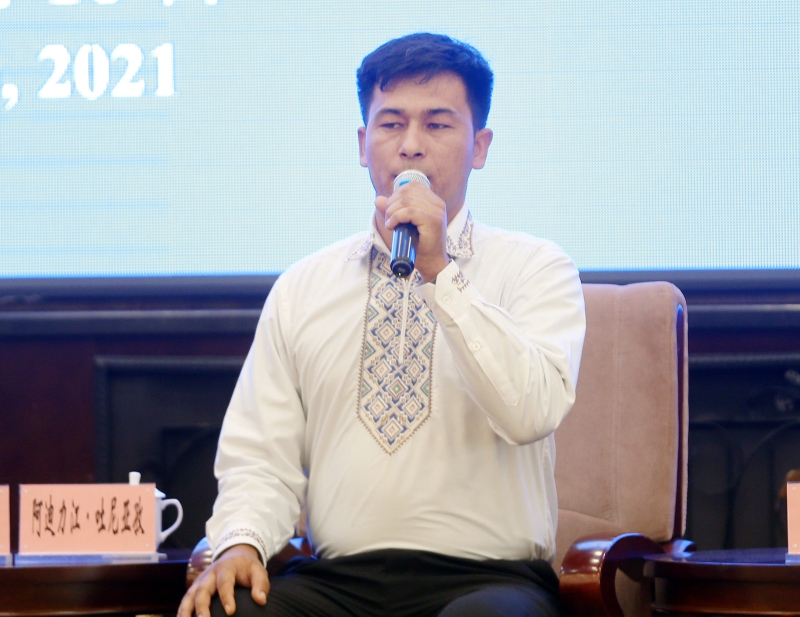
Photo taken on November 16, 2021 shows Adilijiang Tuniyaz speaks at the special press conference on refuting “forced labor” by Xinjiang Uygur Autonomous Region. Photo by Xinjiang Daily/ Li Rui
Adilijiang Tuniyaz: My name is Adilijiang Tuniyaz, a 33-year-old cotton grower from Uruquere Town, Awat County, Aksu Prefecture. There are four members in my family, and we’re living a happy life with sheep, a car and a house. These years, my younger brother and I have lived an ideal life by growing cotton and driving cotton pickers to pick cotton.
When I was a child, the economic conditions of my family was not good, and my parents supported their four sons by engaging in physical work. Every year when it’s the season to pick cotton, my parents would start their work when the dew was still on in the early morning. They had to pick cotton at noon when it was extremely scorching before sending the cotton to the processing plant with a cart. They worked from morning till night, which was absolutely physically demanding.
After graduation, I returned to the village to contract land and grow cotton instead of working in a company. After several-year efforts, the small plots have become big fields, and my family have moved into a beautiful big house. At first we had a motorcycle, then a tractor, and now a large-scale cotton picker and two high horsepower tractors in my family.
In 2019, I bought a large-scale cotton picker together with my friends. The price of cotton picker was relatively high, with a total price of 1.15 million yuan, of which 300,000 yuan was the purchase subsidy of agricultural machinery given by our country. Also, I mastered the skill of driving cotton picker for free. With skills and a new car, I'm indescribably happy. I feel energetic every day and have enough confidence.
From September to December, I would drive the cotton picker to work in the field, and I would be singing while driving when I feel tired. Every day, with the rumbling sound of the cotton picker, the cotton is automatically compressed and packaged into cotton rolls on site, and looking at large bundles of cotton, I feel content and the happiness in my heart is beyond my words. In the past, 100 mus of cotton were picked manually by 10 people, which took two months to finish. Now with a cotton picker, it can be finished in half a day, which greatly saves time, manpower and material resources.
Relying on the cotton picker, I have reaped the benefits of making money. From growing to picking cotton, every household has realized the mechanization of whole process, and we don't have to worry about finding cotton pickers anymore. Last year, the cotton growth and purchasing price of mine and my brother was good, and excluding other expenses, we made a net profit of 300,000 yuan.
In such a way, we have more money and our life is as sweet as sugar. Neighbors and villagers see it and have motivation. Some of them ask me to teach the skills of driving cotton pickers, some consult the experience of cotton management, and my family is lively every day with everybody coming and going.
Last December, I bought a high horsepower tractor, and in March I bought an another tractor in partnership with my younger brother. There was a young man in the village who also wanted to make money and took the initiative to learn from me. Then I hired 3 people: one was to drive cotton pickers, and the other two were to drive high horsepower tractors. I paid them an average of more than 8,000 yuan every month, and we had a smooth cooperation.
This year, the cotton in Korla ripened earlier, so we first went to Korla to pick cotton, and then returned to the town to work. Since we were reliable and capable, with a great reputation, our order was fully booked. My wife and I have roughly calculated that according to the current progress, our income will certainly be more this year compared with last year.
Now, I’ve bought a new car, and my 10-year-old daughter and 6-year-old son are enjoying the good local education and they both have good grades. Next, after finishing picking cotton, I want to buy a house, sell the 30 sheep in my family, take my parents to taste delicious food in winter, travel around and hang out in the county, to enjoy the leisure life. I have brought a video, and let’s take a look.
Recently, we have seen that malicious people on the Internet slandered my hometown by concocting the existence of "forced labor" in cotton production in Xinjiang, which is nonsense. We grow in our own fields and drive cotton pickers and tractors. Not only can we enjoy government subsidies, but the money we earned belongs to us. Some evil people, simply have no good intentions and can't accept the fact that others are living a good life, deliberately sow dissension, undermine our unity and disrupt our peaceful life. You can't even take good care of your own affairs, so how dare you have a finger in our pie? Now that you are idle, just get lost and get back to your own territory and put on the clumsy show. Xinjiang is very beautiful, and people's conscience is as clean as the cotton. Your efforts to discredit or sabotage our life is doomed to be in vain! Our life will be better and better.
Host: Thank you Adilijiang Tuniyaz for your speech.
Host: Meittikrimu Turson is from Qiemo County, Bayingolin Mongolian Autonomous Prefecture. His son graduated from Tarim University. After graduation, he studied at Henan Cotton Research Institute. Now they manage a thousand mu of cotton fields together. Their net income this year is about 500,000 yuan. Now let’s give the floor to Meittikrimu Turson to share his story.
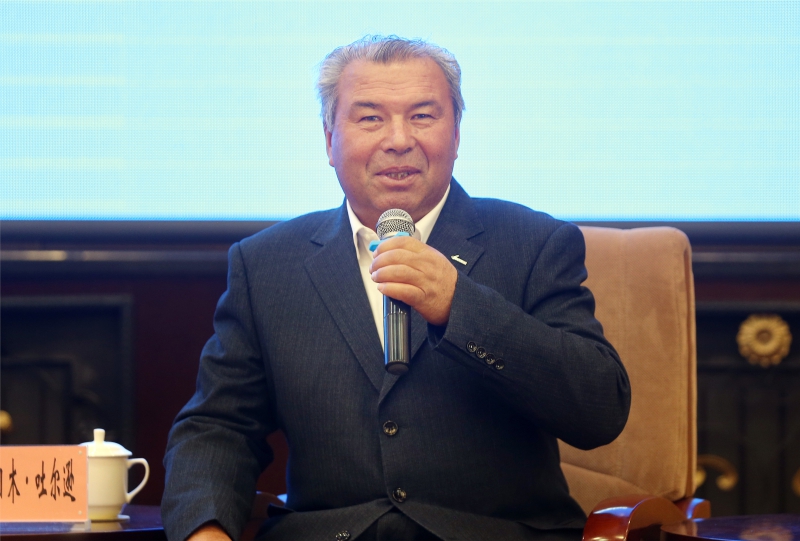
Photo taken on November 16, 2021 shows Meittikrimu Turson speaks at the special press conference on refuting “forced labor” by Xinjiang Uygur Autonomous Region. Photo by Xinjiang Daily/ Li Rui
Meittikrimu Turson: Hello everyone. My name is Meittikrimu Turson. I am a farmer from Tuogelakeaigele Village, Aketikandun Town, Qiemo County, Bayingolin Mongolian Autonomous Prefecture. I am 50 years old. First, let’s watch a video.
Cotton is one of the main cash crops in our township. All the processes was totally mechanized. With the help of satellites, tractors can do the work perfectly by themselves. With the help of plastic covering film laying machine, the work of seeding was also well done. Now a plow man can plow 300 to 350 mu a day, and one worker is capable of planting 100 to 150 mu a day. We are relieved from laborious work.
I now have 7 tractors, 3 film spreading machines, 1 fertilizer spreading machine, 2 wheat seeders, 4 cultivators, 3 dosing machines. This year our cooperative also bought a large UAV which is very convenient. Next year, my 3 dosing machines will be useless. With the UAV, two people can finish 500 to 600 mu a day. It is very useful.
Last year, I set up a cooperative with five cotton farmers. Because of my good cotton growing ability, they recommended me to be the leader and technical adviser of the cooperative. Now in addition to managing my own more than 1000 mu of cotton land, I also have to manage the cooperative of more than 2000 mu of land. Cotton prices are high this year. This year, 350 tons of cotton is expected to be harvested from my 1,000 mu of land, with a net income of more than 500,000 yuan. This is the first year of the establishment of our cooperative. All the land of the cooperative is managed uniformly. There are still 20 farmers who want to join our cooperative, and when the cotton harvest is finished this year, we will let them officially join.
My son is Aizimetti Krimu. After graduating from Tarim University in Xinjiang province in 2020, he was recommended by the university to further his studies at Henan Cotton Research Institute. In July this year, when there was a flood in Zhengzhou, Henan, my son joined the volunteer service team, and I also donated 3,000 yuan to the flood-stricken areas of Henan through the Red Cross. All Chinese should help each other.
Now, my son is better than me. He directed all the cotton planted in our cooperative this year. He told us to take the soil out of the field for testing, to fertilize it scientifically. I usually ask him how to solve the problems of growing through video. This year, our cotton is the best.
Next year, we will have more fields to grow. I've been dealing with cotton for over 30 years. Now that we have technology, we have the ability and confidence to grow cotton better and better. At this rate, our lives will also become better and better. Our hard work has been described as "forced labor" by anti-China politicians in the United States, who have no idea of our real situation. They just want to destroy our happy lives. We will never let it happen.
Host: Thank you Meittikrimu Turson for your speech.
Host: Yasen Meimeijiang lives a better life through growing tomatoes. This year, he planted another bumper crop of tomatoes, yielding about 10 tons per mu. He said that the tomato is his “golden apple”. Now, let’s welcome Yasen Meimeijiang to share his story about tomatoes.
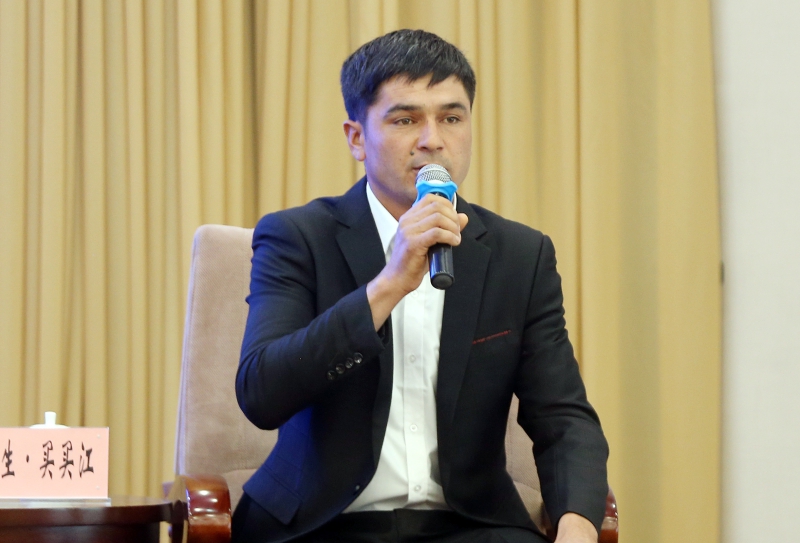
Photo taken on November 16, 2021 shows Yasen Meimeijiang speaks at the special press conference on refuting “forced labor” by Xinjiang Uygur Autonomous Region. Photo by Xinjiang Daily/ Li Rui
Yasen Meimeijiang: Hello everyone. I am Yasen Meimeijiang. I come from Bohu County, Bayingolin Mongolian Autonomous Prefecture. I am 33 years old. There are five members in my family. The main source of income is farming. This year, I planted 120 mu of fields, including 40 mu of wheat and corn, and 80 mu of industrial tomatoes.
Because of the rich natural resources, there is a high yield of industrial tomatoes in Bohu county. In addition, tomatoes grown here also have high lycopene content, making it one of the major tomato producing areas in Xinjiang. I've been growing tomatoes for more than 10 years. At first, I didn't know how to grow tomatoes. The yield of tomatoes was not very high, and life was tough. Therefore, I made up my mind to learn planting techniques. So I often consulted my neighbors and planting experts about the techniques. After several years of learning, I have mastered seed selection, seedling, sowing, field management and other planting techniques. My tomato production has also been increased.
In recent years, mechanical planting has been promoted by the government. Our farmers have also used some new techniques, such as mechanized seeding, mechanized transplanting. Last year, I bought a tomato transplanter. The mechanized transplanting machine can easily complete the process of spreading film, lowering drip irrigation tape, drilling, planting seedlings, planting seedlings, covering soil, etc. While improving efficiency, it also saves a lot of labor costs. With the help of agricultural machinery, my wife and I can easily grow 80 mu of tomatoes. Every tomato picking season, we use a tomato picker to harvest the tomatoes. The harvested tomatoes are transported to conveyors and loaded onto cars before being taken to tomato plants for further processing. The whole harvesting process is mechanized. The picker saves our labor, time and money.
The yield of tomatoes per mu in my family is about 10 tons this year.The cost of machine harvest per mu is about 300 yuan. According to the purchase price of the order, my income per mu of land this year is more than 3,000 yuan, and the net income of tomato planting is more than 100,000 yuan. Here is a video about my life. Let’s watch it together.
Growing tomatoes has made my family's life better over the years. Now I live in a house of more than 200 square meters and have bought a car and a large tractor. When we built our house and repaired our yard, the government gave us a subsidy of 28,500 yuan for the house and 1000 yuan for the construction of the yard. Now the house and the yard are in perfect order. The yard is full of flowers and gourds. There is also an awning in the yard, which is a favorite place for children to play in the summer. In addition, I have a motorcycle which is my favorite. During my leisure time, I like to go out on my motorcycle with my fellow cyclists.
This is my real life. The rumor that there is "forced labour" is nonsense. By growing tomatoes, with our own hands, we live a harmonious and happy life. How come the west anti-China force slander us with groundless lie? They think we are soft target. Their behavior is outrageous and hateful. We live our own lives. We will not be fooled by you, and we will get better and better.
Host: Thank you Yasen Meimeijiang for your speech.
Host: In recent years, the US Department of Commerce and other departments have abused long-arm jurisdiction and export control measures under the pretext of so-called "forced labor", attempting to suppress enterprises in Xinjiang through sanctions. They want to achieve their sinister purpose of bringing chaos to Xinjiang through creating unemployment and poverty. Now, let’s welcome Abuduheli Kilimu, the Deputy General Manager of Security Department Hoshine Silicon Industry (Shanshan) Co., Ltd. to make a brief introduction.
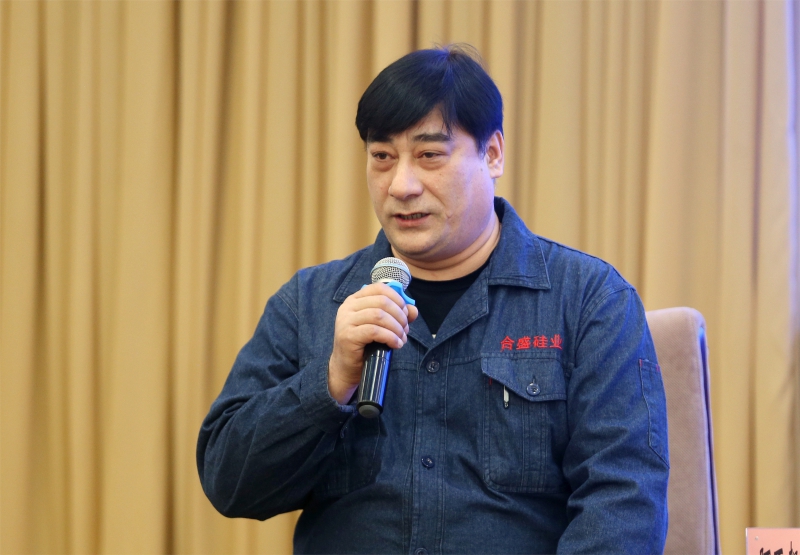
Photo taken on November 16, 2021 shows Abuduheli Kilimu speaks at the special press conference on refuting “forced labor” by Xinjiang Uygur Autonomous Region. Photo by Xinjiang Daily/ Li Rui
Abuduheli Kilimu: Hello everyone. I am Abuduheli Kilimu, the Deputy General Manager of Security Department Hoshine Silicon Industry (Shanshan) Co., Ltd.
Not long ago, the United States imposed sanctions on our company on the pretext of violating the human rights of ethnic minorities in Xinjiang, saying that our company employed "forced labor" in the production of industrial silicon. This is a total rumor and lie.
Hoshine Silicon industry is a global industrial silicon manufacturer and supplier to important domestic manufacturers. At present, we have thousands of employees from more than 20 ethnic groups. My company was named "national unity fellowship activities advanced collective" because of excellent national unity work.
Our company recruits employees in accordance with the principle of preferential recruitment of local staff and two-way free selection. Many of the job seekers are from local ethnic groups. In accordance with the Labor Law of the People's Republic of China, Labor Contract Law and other laws and relevant administrative regulations, our company signs labor contracts with employees on the basis of equality, voluntariness and consensus, and establishes labor relations protected by law. We protect the legitimate rights and interests of our employees and buy various insurance for them. The company implements the 8-hour working day system, and the average monthly salary of employees is more than 5000 yuan.
All kinds of living facilities in the company are equipped, and everyone has meal supplements every month. We provide accommodation and transport to and from work for free. There are basketball courts, badminton courts, supermarkets and infirmary in our company. Every holiday, the company will give benefits to employees and hold festival activities. Employees will be given corresponding holidays for their own affairs according to national laws and regulations. Employees also have paid annual leave, and all labor rights and interests are protected in accordance with the law.
Facts speak louder than words. On the pretext of so-called "human rights issues", the US ignored the facts and put our company on the "entity list", which harmed the interests of the company and all its employees. Here, we express our strong indignation and firm opposition. We will defend the legitimate rights and interests of our enterprises and employees in accordance with the law, and resolutely fight against the unreasonable actions of the United States to the end.
Host: Thanks. Abuduheli Kilimu for his speech.
Host: Next, let’ s give the floor to friends from the media.
Reporter from China Daily: Thank you. I'm with China Daily. For some time, some anti-China forces in the international community have been attacking Xinjiang's employment policies, falsely accusing Xinjiang of forcing ethnic minorities to work and boycotting Xinjiang's cotton. Could you please introduce the real situation of cotton production and picking in Xinjiang? Thank you.
Host: Let’ s give the floor to Guzali Ablizi, Deputy Secretary General of Xinjiang Cotton Association, to answer this question.

Photo taken on November 16, 2021 shows Guzali Ablizi speaks at the special press conference on refuting “forced labor” by Xinjiang Uygur Autonomous Region. Photo by Xinjiang Daily/ Li Rui
Guzali Ablizi: Xinjiang is the largest cotton-producing area in China and an important one in the world. Cotton industry has become an important pillar industry in the area, playing an important role in promoting high-quality economic development, advancing poverty alleviation, rural revitalization, urban and rural employment, and increasing rural incomes.
Cotton production covers a wide area in Xinjiang. More than 50% of farmers plant cotton. Cotton has become the main source of income for local farmers in Xinjiang, especially for the ones in the relevant areas of southern Xinjiang, with cotton planting income accounting for more than 80% of the total agricultural income. The production and development of cotton in Xinjiang has ensured the livelihood of cotton growers, cotton textile workers and their families. Especially in recent years, the promotion and popularity of machine cotton picking has improved the efficiency of cotton planting in Xinjiang and greatly reduced the planting cost, especially the expenditure of labor cost. The promotion of cotton production capacity has driven the development of cotton textile industry in Xinjiang.
In Xinjiang, there is no "forced labor" in cotton production. Not only has the cotton production in northern Xinjiang been basically mechanized, but also the mechanization level of cotton production in southern Xinjiang has been greatly improved in recent years. Cotton production is moving towards the whole process of intellectualization and mechanization, such as ploughing, sowing, management, harvesting, arranging and so on. People have widely used the packaging machine in today' s cotton harvesting. While harvesting, the machine has packed the cotton up, and compressed cotton into a roll. Cotton does not fall to the ground in the whole process, reducing the possibility of contamination with impurities a lot. Cotton fields are mechanized and the cotton rolls are compressed and stacked around the fields for transportation. There is also no need for a large number of "pickers" during the busy harvesting season. The subsidies provided by the government have greatly reduced the cost of purchasing agricultural machinery and tools. With the improvement of mechanization of cotton production, the traditional labor mode has changed greatly. The demand for highly seasonal cotton picking is gradually decreasing. Accusations made by anti-China forces in the US and the West about cotton picking in Xinjiang are seriously groundless. Every link in Xinjiang cotton production process does not exist "forced labor".
Host: Thanks for your introduction, Guzali Ablizi.
Host: Thanks for speakers again. There is no doubt that people of all ethnic groups in Xinjiang are working with dignity in the sunshine and creating a happy and beautiful life. Xinjiang's labor and employment security and practices are in line with China's Constitution and laws, international labor and human rights standards, and the strong aspiration of the people of all ethnic groups in Xinjiang for a better life. Benefiting the people, conforming to the will and winning the hearts of the people can stand the test of the whole world thoroughly. Lies can’ t change the truth after all. Any attempt to undermine Xinjiang's prosperity and development will only result in self-humiliation and be doomed to shameful failure.
That' s all for today' s press conference. Thank you all, speakers and friends from the media.








